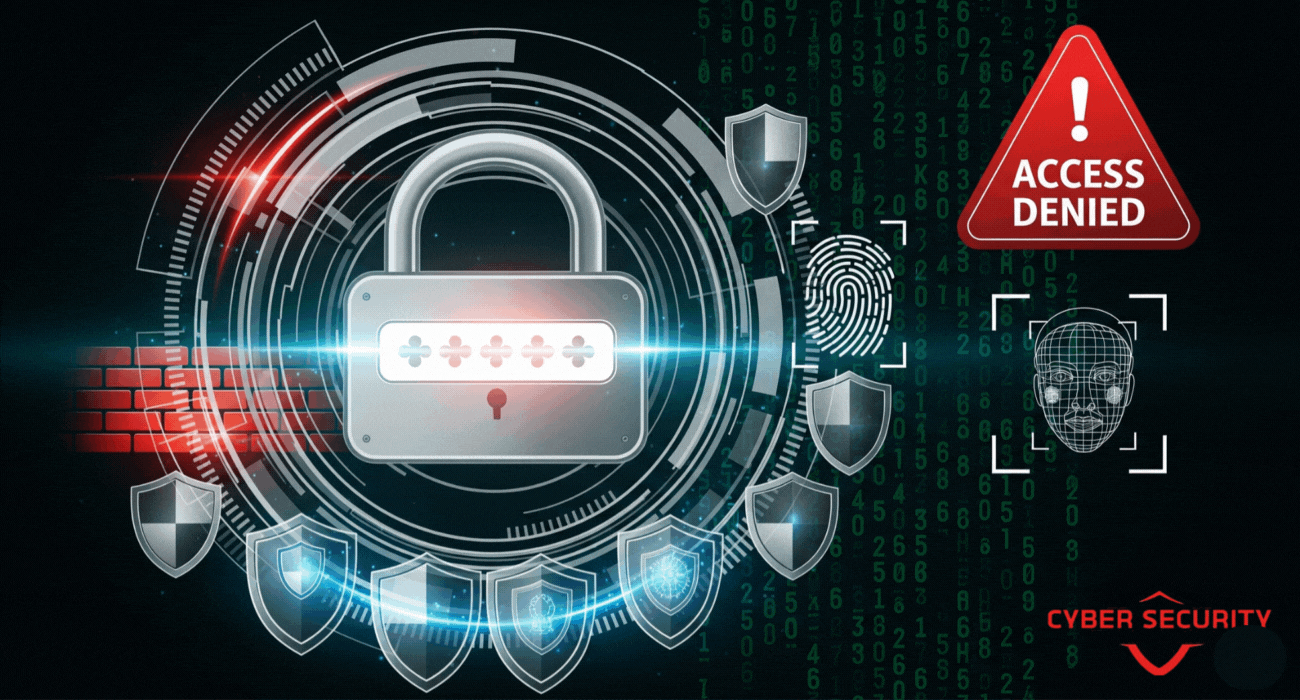What is Password Security in Cybersecurity?
In today’s digital age, passwords are the keys to our online lives. From social media accounts to online banking, passwords protect our personal and sensitive information from unauthorized access. But what exactly is password security, and why is it such a critical part of cybersecurity? Imagine your password as the lock on your front door—weak locks are easy to pick, while strong ones keep intruders out. Password security is about creating and managing those "locks" to ensure your digital world stays safe. This blog post will guide you through the essentials of password security, explaining why it matters, how to create strong passwords, and the best practices to keep your accounts secure. Whether you’re new to cybersecurity or looking to brush up on your knowledge, this guide is designed to be clear, practical, and engaging.

Table of Contents
- What is Password Security?
- Why Password Security Matters
- Common Password Mistakes to Avoid
- How to Create Strong Passwords
- Password Management Tools
- Two-Factor Authentication (2FA)
- Password Security Best Practices
- Conclusion
- Frequently Asked Questions (FAQs)
What is Password Security?
Password security refers to the practices and measures taken to protect passwords from being guessed, stolen, or compromised. In cybersecurity, it’s a foundational element because passwords are often the first line of defense against hackers trying to access your accounts. A secure password is one that is difficult to guess or crack, while password security also involves how you store, manage, and protect those passwords.
Think of password security as a combination of choosing a strong password and adopting habits to keep it safe. For example, using a unique password for each account and storing it securely can prevent a single breach from compromising multiple accounts. Password security also includes technologies like encryption and two-factor authentication to add extra layers of protection.
Why Password Security Matters
Passwords are the gatekeepers of your digital identity. A weak or compromised password can lead to serious consequences, such as:
- Identity Theft: Hackers can use stolen passwords to impersonate you, accessing your email, social media, or financial accounts.
- Financial Loss: Weak passwords can allow cybercriminals to access bank accounts or make unauthorized transactions.
- Data Breaches: A single compromised password can lead to a domino effect, exposing sensitive information across multiple platforms.
- Reputation Damage: If a hacker gains access to your social media, they could post harmful content, damaging your personal or professional reputation.
According to a 2023 report by Verizon, 80% of data breaches involve compromised credentials, such as weak or stolen passwords. This highlights the critical need for robust password security practices in today’s interconnected world.
Common Password Mistakes to Avoid
Many people unknowingly weaken their password security by making simple mistakes. Here are some common pitfalls and why they’re risky:
| Mistake | Why It’s Risky |
|---|---|
| Using simple passwords (e.g., "password123") | Easily guessed by hackers or cracked using automated tools. |
| Reusing passwords across multiple accounts | A breach in one account can compromise others. |
| Writing passwords down on paper | Physical notes can be lost, stolen, or seen by others. |
| Sharing passwords with others | Increases the risk of unauthorized access. |
| Not updating passwords regularly | Old passwords may already be compromised without your knowledge. |
Avoiding these mistakes is the first step toward stronger password security. Let’s explore how to create passwords that are tough for hackers to crack.
How to Create Strong Passwords
A strong password is like a complex puzzle—it’s hard to solve without the right pieces. Here are the key elements of a strong password:
- Length: Aim for at least 12-16 characters. Longer passwords are harder to crack.
- Mix of Characters: Use a combination of uppercase letters, lowercase letters, numbers, and special symbols (e.g., !, @, #).
- Avoid Predictable Patterns: Don’t use easily guessable information like your name, birthdate, or common words.
- Randomness: The less predictable, the better. Random strings like “X9#mP2$qL8v!” are stronger than “MyDog2023”.
One effective method is to use a passphrase—a sentence or series of words that’s easy for you to remember but hard for others to guess. For example, “BlueSky!Coffee2Moon” is a strong passphrase because it’s long, random, and includes a mix of characters.
You can also use a password generator, a tool that creates random, complex passwords for you. Many password managers (discussed later) include this feature.
Password Management Tools
Keeping track of multiple strong, unique passwords can feel overwhelming. That’s where password managers come in. A password manager is a software tool that securely stores and organizes your passwords, so you don’t have to memorize them all.
Popular password managers include:
- LastPass
- 1Password
- Bitwarden
- Dashlane
These tools encrypt your passwords and store them in a secure vault, accessible only with a master password. They can also generate strong passwords and autofill login forms, making your online experience both secure and convenient.
While password managers add a layer of security, it’s crucial to choose a reputable one and protect your master password with the same care as any other important password.
Two-Factor Authentication (2FA)
Even the strongest password can be compromised, which is why two-factor authentication (2FA) is a game-changer. 2FA requires a second form of verification in addition to your password, such as:
- A code sent to your phone or email
- A fingerprint or facial scan
- An authenticator app like Google Authenticator or Authy
By requiring two steps to log in, 2FA makes it much harder for hackers to access your accounts, even if they have your password. Most major platforms, including Google, Facebook, and banking websites, offer 2FA as an option—enable it wherever possible.
Password Security Best Practices
To keep your passwords secure, adopt these habits:
- Use Unique Passwords: Never reuse passwords across different accounts.
- Update Regularly: Change passwords every 6-12 months or immediately if you suspect a breach.
- Beware of Phishing: Don’t enter passwords on suspicious websites or links. Always verify the URL.
- Use Secure Networks: Avoid logging into accounts on public Wi-Fi without a VPN.
- Monitor Accounts: Regularly check for unauthorized activity and set up alerts for suspicious logins.
- Educate Yourself: Stay informed about the latest cybersecurity threats and best practices.
By following these practices, you can significantly reduce the risk of your accounts being compromised.
Conclusion
Password security is a cornerstone of cybersecurity, acting as the first line of defense against unauthorized access to your digital life. By creating strong, unique passwords, using password managers, enabling two-factor authentication, and following best practices, you can protect your accounts from hackers and minimize the risk of data breaches. While no system is foolproof, taking these steps makes it much harder for cybercriminals to target you.
In a world where cyber threats are constantly evolving, staying proactive about password security is essential. Start implementing these tips today, and you’ll be well on your way to a safer online experience.
Frequently Asked Questions (FAQs)
What is a strong password?
A strong password is at least 12-16 characters long, includes a mix of uppercase and lowercase letters, numbers, and special symbols, and avoids predictable patterns or personal information.
Why shouldn’t I reuse passwords?
Reusing passwords allows a hacker who compromises one account to access others, increasing the risk of widespread damage.
What is a password manager?
A password manager is a tool that securely stores and organizes your passwords, often generating strong passwords and autofilling login forms.
Are password managers safe to use?
Reputable password managers use strong encryption to protect your data, but you must secure your master password to ensure safety.
What is two-factor authentication (2FA)?
2FA adds a second verification step, like a code sent to your phone, to make it harder for hackers to access your account.
Can I use the same 2FA method for all accounts?
Yes, but using different 2FA methods (e.g., authenticator apps vs. SMS) can add extra security for critical accounts.
How often should I change my passwords?
Change passwords every 6-12 months or immediately if you suspect a breach or receive a security alert.
What is a passphrase?
A passphrase is a longer password made up of multiple words or a sentence, like “SunnyHill!Star4Rain,” which is easier to remember but hard to guess.
Can I write down my passwords?
It’s risky to write passwords down, especially on paper that can be lost or seen. If you must, store them in a locked, secure location.
What should I do if my password is compromised?
Change the password immediately, enable 2FA, and monitor the account for suspicious activity. Update similar passwords on other accounts.
Why are short passwords unsafe?
Short passwords are easier for hackers to guess or crack using automated tools, making them less secure.
Can I use my pet’s name as a password?
No, personal information like pet names is easily guessable. Use random, complex passwords instead.
What is phishing, and how does it affect password security?
Phishing is when hackers trick you into entering your password on a fake website. Always verify URLs before logging in.
Is it safe to save passwords in my browser?
Browser-saved passwords can be vulnerable if your device is compromised. Use a password manager for better security.
What is a brute force attack?
A brute force attack is when hackers use software to try thousands of password combinations until they find the right one.
How can I tell if a website is secure for entering my password?
Look for “https://” in the URL and a padlock icon in the browser’s address bar, indicating a secure connection.
Should I use public Wi-Fi to log into accounts?
Avoid public Wi-Fi unless you’re using a VPN, as these networks can be intercepted by hackers.
What is encryption in password security?
Encryption scrambles your password into unreadable code, making it harder for hackers to steal even if they access it.
Can I share my password with a trusted friend?
Sharing passwords, even with trusted people, increases the risk of unauthorized access. Avoid it whenever possible.
How do I know if my accounts have been breached?
Use services like Have I Been Pwned to check if your email or passwords have appeared in known data breaches.
What's Your Reaction?
 Like
0
Like
0
 Dislike
0
Dislike
0
 Love
0
Love
0
 Funny
0
Funny
0
 Angry
0
Angry
0
 Sad
0
Sad
0
 Wow
0
Wow
0














